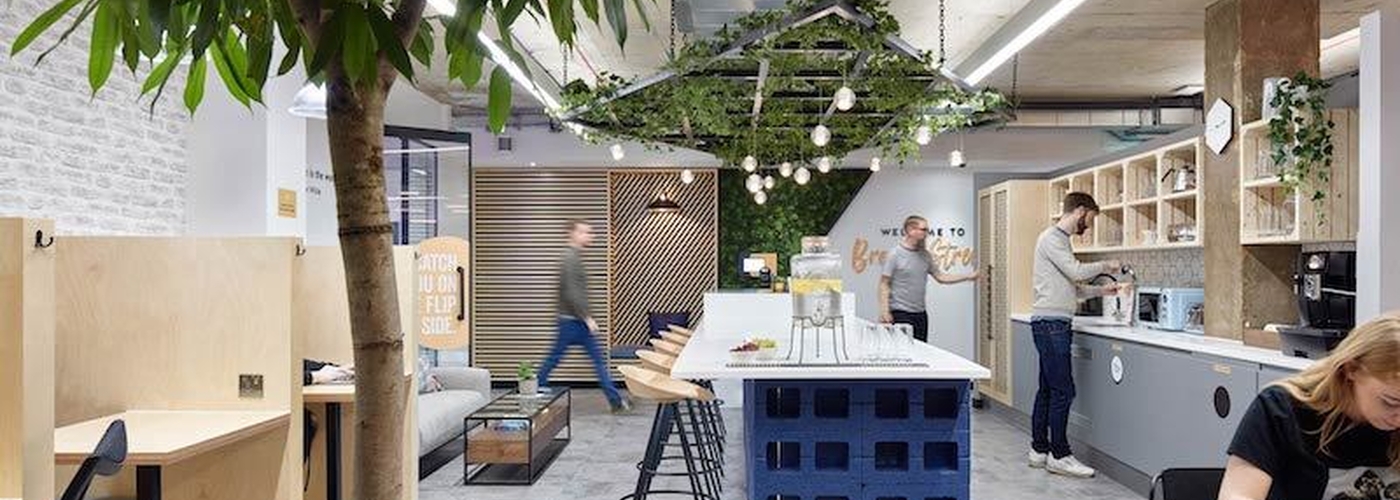You've probably heard co-working is the future, but what's the big deal? We try find out...
The traditional office model is dead. Co-working is the future. But you probably already knew that. These type of workspaces have been popping up across Manchester like spots on a pubescent teenager’s face.
They offer flexibility, community, collaboration, free coffee, hot desks, yoga and sometimes even beer. This all sounds great, but what does it all mean?
What is 'co-working'? Who uses the spaces? Are they really that much better? What are the perks? And how much does it all cost?
We spoke to Chloe Kiln, community executive at Work.Life, to find out what's going on...
We have eGaming companies, charities, filmmakers, recruiters, marketeers, and even a beauty salon. You’ll find anyone and everyone at our desks.
Co-work spaces seem to be popping up all over the place. Why the sudden influx... what’s going on?
Chloe Kiln: "Let’s start with the less-glamourous bits. For businesses, they offer a managed and flexible office solution. From day one, you’re in a ready-to-work space meaning you can get straight to business and not waste precious time worrying about dodgy Wi-Fi connections or making sure you’re in for the printer delivery.
"Likewise, if you’re hot desking, you have somewhere to invite clients to, access to meeting rooms, printing and an impressive address to register your company to.
"Another huge draw – especially for individuals and smaller businesses – is the collaborative working nature that co-working spaces promote. The kitchen table can be a very lonely place and sitting next to people in a similar situation every day could prove to be invaluable. You never know who you could be sitting next to, maybe it’s a future client or maybe you’re beetling away beside your new business partner."
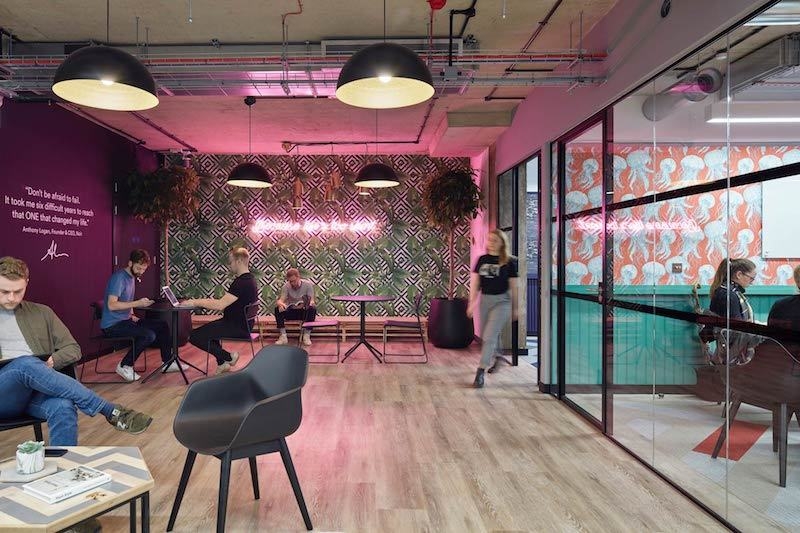
In your experience, are co-working space users happier than those in traditional office spaces?
CK: "In my experience, definitely. Of course business owners want their teams to be happy and there can be very real mental and physical benefits to moving your team into a co-working space. The regular socials, events and opportunities to get to know other companies can really boost team morale and instil a company culture that you otherwise might not have the time or resources to create alone.
"Equally, you’re in an environment that’s primed and ready to attract talent. Being able to tell your potential new recruit about all the perks that they’ll receive whilst working in the co-working space is not to be underestimated.
"Finally, the amazing locations that co-working spaces are often in, offer a more affordable way to work in some of the best postcodes in the country."

So is the traditional office model dead? And is the 9-5 dying with it?
CK: "It’s definitely heading in that direction. The traditional office model just doesn’t allow for the flexibility, collaboration and stimulation that teams have (rightly) come to expect.
"One of the many perks of joining a co-working space is the flexibility; you might join as a team of two and six months down the line have three more employees. Availability-dependent, you can move between offices or even different locations if you fancied trying out a new area. Co-working spaces can grow with you.
"For many people the 9-5 no longer exists, especially for those in the early stages of their business. With flexible working on the rise, people are looking for somewhere productive to work one, two, or seven days a week and a co-working space offers just that. Pop in for a few hours between meetings or enjoy 24/7 access for those all-important Saturday sessions, distraction-free.
What sets Work.Life apart from, say, WeWork or Regus?
CK: "At Work.Life, we’re on a mission to create a happier, more engaging workspace experience. The correlation between happy workers and business success is often overlooked and we’re working hard to change this, by improving workspace happiness through curated events, exclusive wellness perks and even a ‘Work Happy’ podcast coming this April, digging deep into the secrets of workplace happiness, with advice from experts, entrepreneurs and coaches in the field.
"We’re purposely smaller than many other co-working providers, never taking spaces over a certain square footage, facilitating a real community. We offer a truly personal service, our membership team know the name of everyone who walks through the door and genuinely care about you and your team’s success.
"And we build our spaces around our people. You're more of a jelly bean person than jelly babies? We'll swap them out. You're struggling to find meeting rooms? We'll try opening another. However big or small a member's request: if we see the demand, we'll make the change. We've found that it's often the little things that make the biggest difference."
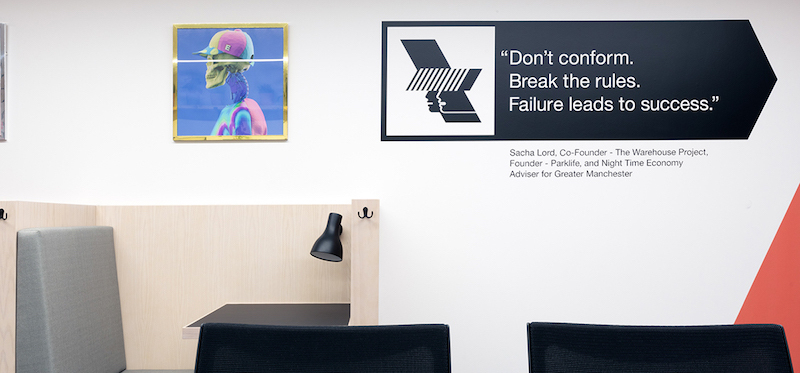
Who uses the space (is there a wide range of professions, ages and industries?) and what’s on offer (where’s the table tennis)?
CK: "We have a diverse range of industries in our spaces, from your eGaming companies, charities, and filmmakers, to your recruiters, marketeers, and even a beauty salon. Our Verizon partnership at our Clerkenwell space attracts tech companies but overall there really is no typical Work.Lifer. You’ll find anyone and everyone at our desks.
"The Work.Life gang ourselves are a young team but we have members of all ages. They’re a diverse bunch, creating a truly exciting hub of creativity.
"No table tennis (except for in our London Fields space) I’m afraid but rest assured there’s plenty more to keep you busy. Breakfast Mondays, Wellness Wednesdays, Thursday Beer + Pizza evenings and free weekly yoga. There are always things going on in the spaces: pop-ups, charity fundraisers, skill sharing “Lunch and Learns” and desk yoga, just to name a few."
How long before the corporates come along and ruin it for everybody?
CK: "It’s a very competitive industry with some big corporates already in the game. Of course, with the heavily-invested there’s always going to be a bit of worry, but as long as you stay true to your core values and attract the kind of people that share them too, you’re going to be fine.
"We’ll never be the kind of co-working space to take twenty story buildings - even if it was in our financial interest - likely making us different to the corporates. Our business strategy is unique, which was (very excitingly!) recently recognised by us winning Hubble’s 2019 Innovative Business Model Award."
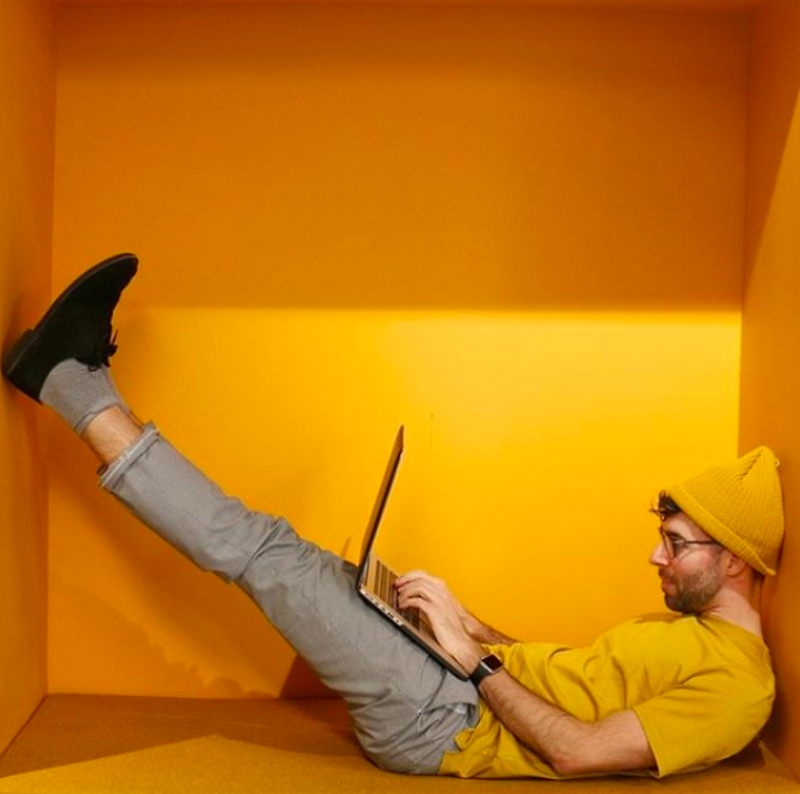
The term ‘Community’ seems to get thrown around a lot - but is it all yoga and pizza nights or do people/businesses genuinely come together, forging new ideas and opportunities?
CK: "It does get thrown around a lot and we even contemplated not using it in our communications because we were worried it’d lost its credibility, but when you have a very real and lovely group of people working (and playing) in the same space, it’s hard not to shout about it. For us, it really isn’t a buzzword and anyone who currently is or ever has been a Work.Life member knows what we’re talking about.
"Our smaller spaces definitely make this easier to achieve - you only need to come to one of our Beer and Pizza evenings to see businesses happily come together - and we’ve seen time and again that these seemingly minor social interactions do lead to great business deals and collaborations.
"We also have a portal allowing members to connect and see which other industries are residing in our spaces, and we constantly see people asking for advice and recommendations, whether that’s help designing a logo or two companies taking an office together – co-working at its finest."
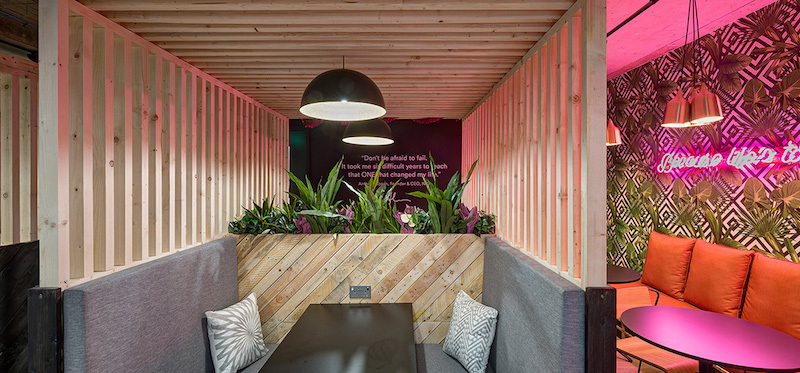
Lastly, how much does it cost?
"We have three different memberships: Flex, Local and Resident. Flex is our pay-as-you-go membership which is best for people who won’t be using the space as their everyday office, maybe they’re only in the city twice a week. This costs between £4-5 + VAT an hour, simply tap in, tap out, no strings attached.
"Local is our all-inclusive hot desking membership, with lots of added goodies, such as free printing and meeting room credits. This varies depending on location but it’s between £200-£350 + VAT per month. Definitely the best option for people who will be using this as their office most days.
"Our Residents grow their entire businesses from our spaces. Private offices work on a price per desk basis, which again varies from space to space, ranging from £300-655+VAT per desk depending on where it’s located."
You can find Work.Life Manchester inside the Core Building on Brown Street, Manchester M2 1DH - there's more on the website here.




